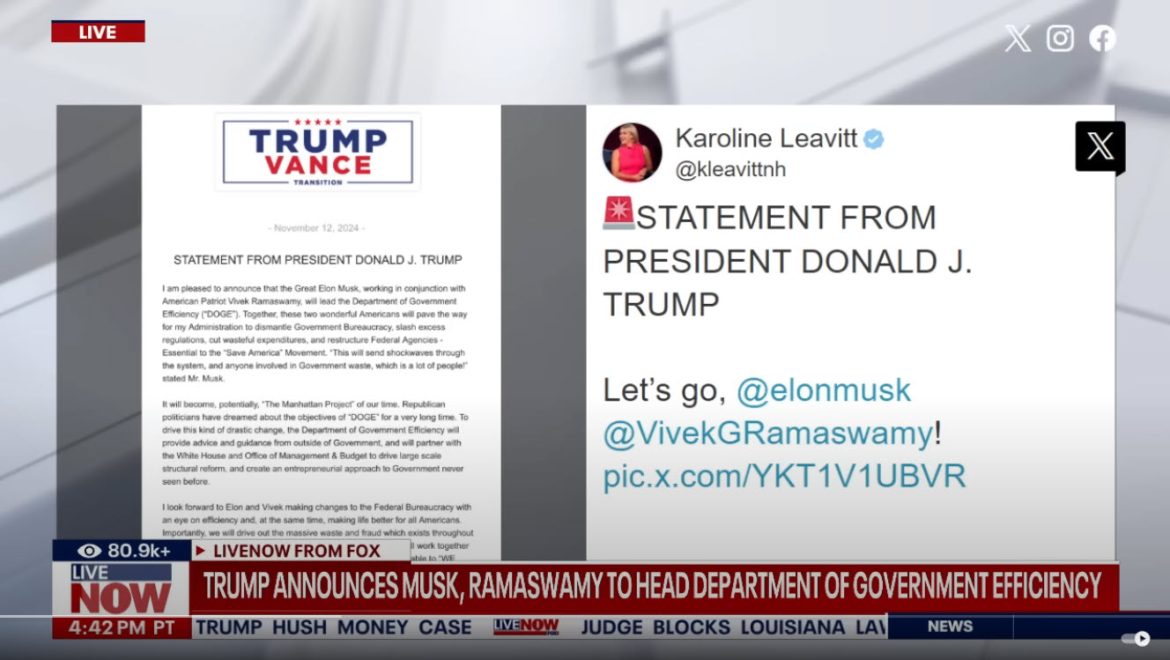President-elect Donald Trump has named billionaire Elon Musk and former presidential candidate Vivek Ramaswamy to lead the newly established Department of Government Efficiency, a role aimed at overhauling federal bureaucracy and restructuring government agencies. Trump’s appointment of Musk, CEO of Tesla and social media platform X (formerly Twitter), and Ramaswamy, an entrepreneur and political newcomer, signals a bold approach to slashing government inefficiency, a hallmark of Trump’s campaign promises. This move, however, is already drawing mixed reactions within Trump’s inner circle and sparking media speculation.
In his announcement, Trump praised Musk and Ramaswamy as forward-thinking leaders uniquely positioned to “pave the way” for a streamlined government structure. “Elon and Vivek have the vision and tenacity to cut through the red tape and bureaucracy holding America back,” Trump said, emphasizing the need for radical reform in Washington. “Our administration will bring efficiency to government like never before.” Trump has tasked the two with conducting a sweeping review of federal agencies, identifying redundancies, and recommending ways to eliminate waste across departments.
Musk, known for his ambitious projects and outspoken views on government intervention, called the initiative a “system shock” that would be felt throughout the federal structure. “This isn’t just a change in leadership. It’s a fundamental shift that will send shockwaves through the system and anyone benefiting from government waste,” Musk stated. He expressed enthusiasm for what he called “the historic opportunity” to apply his problem-solving approach to federal inefficiency.
Ramaswamy echoed Musk’s sentiments, adding that he plans to apply principles from the private sector to revamp how federal agencies operate. A vocal critic of “big government,” Ramaswamy has long advocated for a government that operates “like a business” and holds bureaucrats accountable for measurable outcomes. “Our goal is to reduce unnecessary government spending and improve responsiveness, making government work for the people, not the other way around,” he said.
However, not everyone in Trump’s circle is enthusiastic about Musk’s involvement. According to NBC News, several Trump advisers and allies at Mar-a-Lago are reportedly growing uneasy with Musk’s influence. Some close to Trump feel that Musk is “overstepping” and presenting himself as an almost co-presidential figure, frequently joining Trump in meetings, calls, and late-night discussions. “He’s behaving as if he’s a co-president and making sure everyone knows it,” an anonymous source told NBC, highlighting Musk’s tendency to take credit for Trump’s Election Day win.
Musk’s frequent appearances at Mar-a-Lago, where he watched the election results alongside Trump, have also drawn mixed reactions from those within Trump’s team who see him as a polarizing figure. “Elon is brilliant but disruptive, and sometimes his way of asserting himself rubs people the wrong way,” one insider commented, suggesting that Trump’s choice to place Musk in a leadership role might be both a strategic asset and a source of internal friction.
Critics are also questioning Musk’s qualifications for overseeing government functions, given his corporate background and history of clashes with regulatory bodies. While Musk’s track record includes high-profile successes with Tesla and SpaceX, his management style has faced scrutiny, with some doubting whether it aligns with the accountability expected in federal government roles. “Running a private company and leading a federal department are fundamentally different challenges,” said political analyst Sarah Porter. “Elon Musk’s leadership style could be an asset in shaking things up, but it could also pose challenges if he doesn’t adapt to the different demands of government work.”
As for Ramaswamy, many expect him to take a measured approach compared to Musk’s bold style. His recent political rise and calls for government transparency have attracted support from Republicans who view him as a disciplined reformer. Ramaswamy’s business-oriented approach aligns well with Trump’s vision, and he has expressed support for Musk’s unorthodox methods, calling them a “necessary wake-up call” for Washington.
The Department of Government Efficiency will launch with an initial review phase, during which Musk and Ramaswamy will examine operational structures within federal agencies to identify inefficiencies. Early reports indicate that the department’s agenda may include reducing agency budgets, consolidating overlapping programs, and exploring the potential for privatization in certain areas. Analysts say that if Musk and Ramaswamy’s recommendations are implemented, they could fundamentally reshape federal operations and cut significant costs.
Public opinion on the department’s creation remains divided. Supporters of Trump’s administration applaud the appointments as a bold step toward slashing what they see as government waste and overreach. Critics, however, express concerns about potential risks to essential services and worry that Musk and Ramaswamy’s privatization-minded approach could lead to layoffs and reduced support for federal employees.
As the duo prepares to roll out their plans, all eyes will be on Washington to see how Musk and Ramaswamy’s unconventional leadership will impact the federal government’s future structure and efficiency. Their success—or failure—could have far-reaching implications for the role of business principles in American governance and the Trump administration’s broader agenda.



